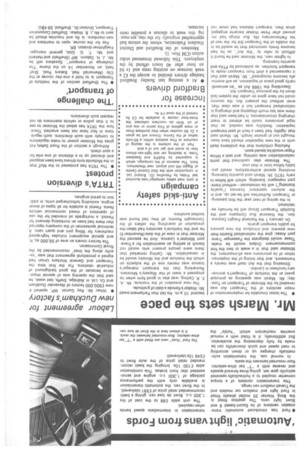Mr. Marsh sets the pace
Page 31

If you've noticed an error in this article please click here to report it so we can fix it.
• The latest timetable for implementation of major sections of the Transport Act was revealed by the Minister of Transport on Tuesday; Mr. Marsh was speaking as principal guest at the Institute of Transport's anniversary luncheon in Landon.
Stressing that the Act itself was merely a framework, and that timing of the implementation of its provisions was all-important, the Minister said that in a week or two the first commencement Orders would be made. These would designate the Passenger Transport Areas; give the nationalized Boards their new powers; and introduce the new powers for public transport grants.
On January 1 the National Freight Corporation, the National Bus Company and the Scottish Transport Group will be formally established.
In the spring of next year the first passenger Transport Authorities will be set up, and in the autumn operators' licences ("quality licensing") will be introduced—without transport managers' licensing, which will follow in early 1970. Mr. Marsh said.quantity licensing, involving special authorizations, would probably follow later in that year.
The Minister also confirmed that ports nationalization was coming, and said a White Paper would be issued soon.
Refuting criticisms that the problems dealt with in the new legislation should have been thought out at greater length, Mr. Marsh said that rigidity had been a fault of past transport legislation; flexibility was needed, so that legal provisions could be altered to meet changing circumstances. It had been said that there was too much chopping and changing in nationalized transport but it was clear that, even without the present Act, the country could not have gone on under the system laid down by the previous Transport Act.
Describing the 1968 Act as "an extraordinarily good piece of legislation, as will eventually become recognized", Mr. Marsh said that it represented a shift from transport mode to transport function, as evidenced by PTAs and quantity licensing.
In lighter vein, the Minister said he found it difficult to refer to "the Act", as he had become firmly convinced that he would be in the middle of the Transport Bill for the rest of his Parliamentary life. But things had improved after Peter Walker .became engaged; since then, transport debates had never run beyond 10 p.m. He felt that Parliament owed Mr. Walker's fiancee a debt of gratitude.
The new president of the Institute, Mr. A. F. R. Carling, was also in good form when he proposed a toast of Her Majesty's Ministers. Remarking that the transport manager's licence was merely one of the subjects on which the Institute and the Ministry would be in consultation, Mr. Carling remarked that there were people present who would not blanch at setting an examination for a Transport Minister's Licence. And he assured the Minister that in view of the date (November 5) he and the Institute's secretary had taken the precaution of searching the cellars of the Connaught Rooms; all they had found was bottled sunshine.




























































































































































